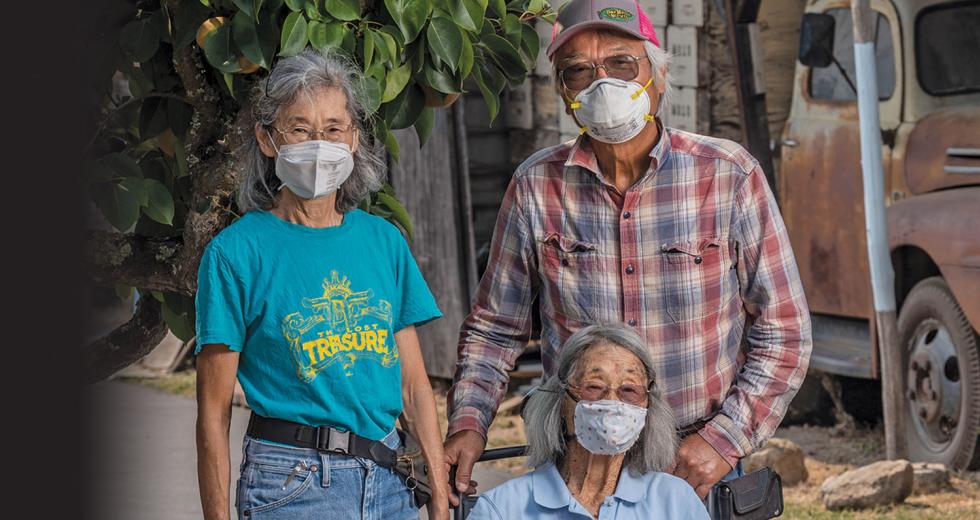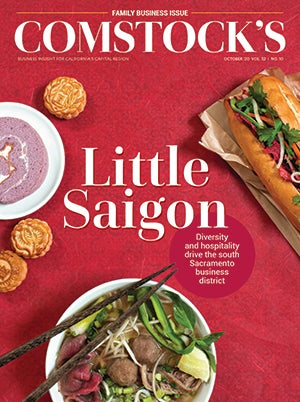First, the skin is peeled, then the fruit is strung and hung to dry, and each one gets massaged by hand several times a week for up to six weeks. They are hoshigaki, a Japanese style of dried persimmon, and they are Otow Orchard’s claim to fame — Huell Howser even filmed an episode of “California’s Gold” featuring the orchard in 2007.
The Granite Bay farm has been around long before Howser’s visit, though. In 1911, Kitchitaro Kawano, a Japanese immigrant, bought the land with his wife, Momi. Kawano died in 1939, and his and Momi’s daughter, Helen Otow, and husband, Seiichi Otow, took over farm operations in the 1940s after their incarceration at the Tule Lake internment camp during World War II and a brief stay in Chicago. These days, their daughter, Chris Otow Kuratomi, and son-in-law, Tosh Kuratomi, run operations — although, at 104, Helen still does some work on the farm, like tying and massaging the persimmons.
“We try to draw everybody into the family, so to speak, whether it’s the workers, … the other farmers. One year, (the strawberry farmer) had a real hard time, and I said, ‘I’ll refund you your rent money. I’d do the same thing for my kids.’”
Tosh Kuratomi farm manager, Otow Orchard
Some of the persimmon trees are about 100 years old, but the Otows began making hoshigaki around the 1960s. In addition to 11 varieties of persimmons on 5-6 acres of the 20-acre orchard, the Otows grow multiple varieties of peaches, Asian pears, quince, figs, apples, nectarines, pomegranates, olives and mandarins, as well as jujubes and wild blackberries, all of which are sold at Otow Orchard’s year-round, on-site farm stand. The family owns about 40 acres total and rents a portion of the land to a strawberry farmer, firewood harvester and apiarist. They sell honey from the latter as well as eggs, vegetables and fruit from other local producers at the stand.
“These guys don’t have markets,” Tosh says. “Placer County agriculture (for) fruits and vegetables is so small that it’s to our advantage, I think, to promote each other versus trying to put each other out of business.”
Other than diversifying the produce the farm stand offers, buying from local growers creates a community, and that becomes crucial if the Otows’ persimmon harvest is low. “There are years where you hardly have any persimmons,” Tosh says. “We really need these other guys. … In a sense, we’re helping them out, but … when we get in a pinch, it’s really nice to have that backup.” He says having an agricultural community is “more important than just a few successful farms.”
Chris Otow Kuratomi works in the farm stand.
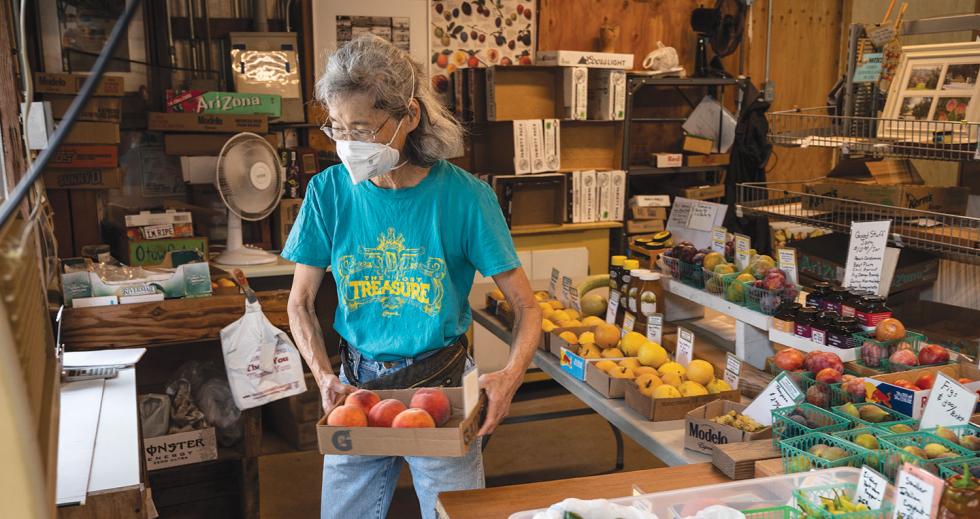
Beyond the farm stand, Otow Orchard sells its fresh and dried persimmons by mail order through its website. “I would guess we send the persimmons to some 30 states,” Tosh says, with California, Hawaii, New York and New Jersey as the top buyers. The family has high standards for the quality of its labor-intensive hoshigaki, which cost up to $50 a pound. The fruit is harvested in the fall, and “we’re working until 12 o’clock or 1 o’clock in the morning every night until New Year’s, and we’re making 2,000 pounds at the most,” he says. “Why would we want to make 10,000 pounds? We kind of figure what we need to survive, and that’s what we charge. We apologize — I think we’re at the point where if we have to give it up, we’ll give it up. (But people say,) ‘Oh no, don’t do that.’”
Although Tosh married into a farming family and spent 25 years as a teacher for Sacramento City Unified School District, his lineage also has farmers — his grandfather farmed in Loomis. He and Chris, who worked as a speech language pathologist and English as a second language teacher, started helping out on the farm during summers and weekends in the 1970s and took over farm operations when they retired in 1999 and 2005, respectively. They have been married for 47 years and have three adult children, and their daughter-in-law, Christy Kuratomi, works at the farm stand. Tosh says he’s not sure who is going to take over next, though he’d like to see one of his part-time employees take over until one of the children retire and is ready to continue the orchard’s legacy.
“We try to draw everybody into the family, so to speak, whether it’s the workers, … the other farmers,” Tosh says. “One year, (the strawberry farmer) had a real hard time, and I said, ‘I’ll refund you your rent money. I’d do the same thing for my kids.’”
—
Stay up to date on business in the Capital Region: Subscribe to the Comstock’s newsletter today.
Recommended For You
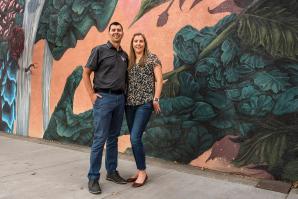
Care Givers
Family business close-up: All-Cal Insurance Agency in Roseville thrives by providing coverage for nonprofits
Nonprofits make up 97 percent of All-Cal’s clientele, which has
been run by the Esparza family in Roseville for more than 30
years.
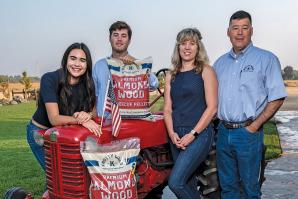
Pellet Pitchers
Family business close-up: Knotty Wood Barbecue Company invents a new use for old almond trees
Tens of thousands of acres of almond orchards are pulled up each
year in California. Knotty Wood is out to put those trees to
better use.
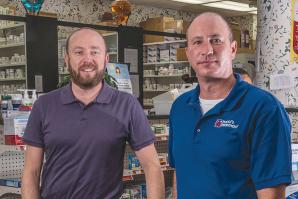
Patient Pleasers
Family business close-up: Pucci’s Pharmacy is a full-service drugstore that focuses on personalized care
Clint Hopkins and his husband Joel Hockman are the current owners
of Pucci’s Pharmacy in Sacramento, a 90-year-old business with a
long history of inclusion.



